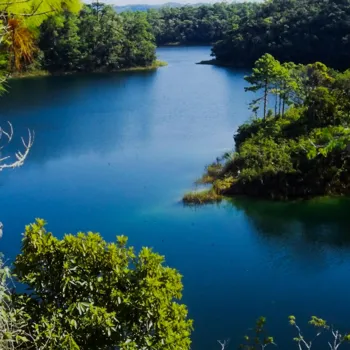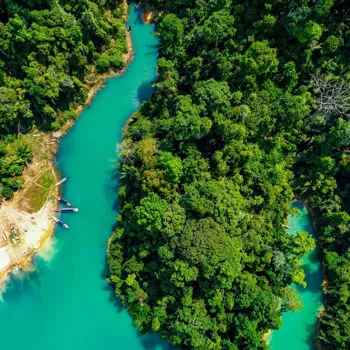Explore Sustainable Travel: Reduce Carbon Footprint & Support Local Communities. Learn 8 Ways Now!
Namaste, travellers! Are you planning your next holiday? Wonderful! But before you pack your bags and book
your tickets, let's talk about something truly important: sustainable travel.

Our beautiful Bharat and its incredible landscapes are treasures, and it's crucial we protect them while exploring them. Sustainable travel is all about making responsible choices that minimize your impact on the environment and support local communities.
It's about enjoying the wonders of our planet without harming it for future generations. Think of it as travelling with a conscience. It's not just a trend, it's a necessity. So, how can you travel more sustainably?
Worry not, we've got you covered with eight simple yet effective ways to reduce your carbon footprint and travel responsibly.
Opt for eco-friendly transport in India to cut carbon footprint
First things first, consider your transportation. Aeroplane travel contributes significantly to carbon emissions. When possible, opt for trains or buses, especially for shorter distances within India. Our Indian Railways has an extensive network, connecting almost every corner of the country.

Not only is it more eco-friendly, but it also gives you a chance to soak in the beauty of our diverse landscapes. If you absolutely must fly, try to book direct flights – they use less fuel than flights with layovers. Also, pack light! The heavier your luggage, the more fuel the plane needs.
Choose airlines that are invested in sustainable aviation fuel or are taking steps to reduce their carbon emissions. Within cities, walk, cycle, or use public transport whenever possible. Many Indian cities are now embracing cycling and have dedicated cycle tracks.
Download apps that show you bus routes and train schedules. Not only will this reduce your carbon footprint, but it'll also give you a more authentic travel experience, allowing you interact to localities and observe the daily routines of locals from close.
Choose eco-friendly accommodations for sustainable travel
Next up, let's talk about accommodation. Choose eco-friendly hotels or guesthouses that are committed to sustainability. Look for certifications like LEED (Leadership in Energy and Environmental Design) or Green Key.
These accommodations often have practices in place such as using renewable energy, conserving water, reducing waste, and sourcing local produce. They may also have programs to support local communities. Consider homestays or guesthouses that give revenue directly to families.
When you're in your accommodation, be mindful of your resource consumption. Turn off the lights and air conditioning when you leave the room. Reuse your towels and sheets. Conserve water while showering. Little actions add up!
Support local economies by staying in locally owned and operated establishments. Moreover, look for accommodations that have a water conservation policy. This is mostly helpful in areas that are scarce in water. Avoid wasting food during your stay and try to discard only what is needed.
Accommodations providing basic amentities will cut down on using the carbon footprints. Selecting the right stay for your travel is very important!
Focus on responsible consumption, avoid single-use plastics, buy local, use sustainable materials
Now, let's focus on responsible consumption. One of the easiest ways to reduce your impact is to avoid single-use plastics. Carry your own reusable water bottle, shopping bag, and cutlery.
This will help you avoid plastic bottles, bags, and utensils, which often end up polluting our land and water bodies. Many Indian cities now have water refill stations, so you can easily refill your bottle on the go. When shopping, buy locally made crafts and souvenirs.
This supports local artisans and reduces the environmental impact of transporting goods from far away. Look for products made from sustainable materials like bamboo, cotton, or recycled materials. Bargain with a smile and respect the artisan's work.
Avoid purchasing items made from endangered species or contributing to the illegal wildlife trade. Before you venture on travel, make sure you are packed with the proper gear, so you do not leave any waste material behind during the trip.
This small change can reduce your impact on the environment, and travel becomes easier.
Embrace local cuisine to support community and reduce food waste
When it comes to food, embrace local cuisine. India is a land of diverse flavours and regional specialties. Eating at local restaurants and street food stalls not only gives you a culinary adventure but also supports local farmers and businesses.
Choose seasonal produce and avoid ordering food that has to be transported from far away. Be mindful of food waste. Order only what you can eat. If you have leftovers, ask for a takeaway container. Avoid restaurants that use disposable plates and cutlery.
Many local eateries use traditional plates made from leaves or biodegradable materials. Explore local farmer's markets and buy fresh produce directly from the source. It's a great way to connect with the local community and learn about their traditions.
Look, for instance, for healthy eateries or restaurants where less food is wasted. Ensure you are visiting places which have a better approach towards food waste. These small changes bring a better effect on the locals.
Respect local culture, environment, learn language, dress modestly, support conservation, travel responsibly
Respect the local culture and environment wherever you go. Learn a few basic phrases in the local language. Dress modestly when visiting religious sites. Be mindful of local customs and traditions. Take only pictures and leave only footprints. Avoid littering or damaging natural habitats.

Stick to marked trails when hiking. Don't disturb wildlife or their habitats. Support conservation efforts by visiting national parks and wildlife sanctuaries responsibly. Hire local guides who can share their knowledge of the local environment and culture. Be an ambassador for responsible travel.
Encourage others to travel sustainably. Share your experiences and inspire others to make a difference. Be aware of what you are doing. Talk with locals and understand their culture. By learning about the local culture, the travel experience enhances as well.
Offset carbon emissions by supporting renewable energy
Lastly, offset your carbon emissions. Even with the best efforts, travelling can still contribute to carbon emissions. Consider offsetting your emissions by donating to organizations that support renewable energy projects, reforestation efforts, or other environmental initiatives.
There are many reputable organizations that offer carbon offset programs. You can calculate your carbon footprint using online calculators and then donate accordingly. Educate yourself about the environmental impact of your travel choices.
The more you know, the better equipped you are to make informed decisions. Remember, sustainable travel is a journey, not a destination. It's about making conscious choices and continuously learning and improving.
By embracing these eight tips, you can reduce your carbon footprint, support local communities, and enjoy the wonders of our incredible planet responsibly. Happy travels!
Train travel fosters cultural exploration, enhances environmental sustainability
Traveling in trains helps explore the local culture and is also better for the environment! It gives you an opportunity to observe daily routines from a closer perspective and helps you interact with communities. Many Indian cities embrace cycling culture nowadays, so make use of that too.

Plan your travel as you travel since you will have an actual idea of your whereabouts. This change brings a better and meaningful effect on the locales and on the environment.
Choose eco-friendly hotels for local support and reduced carbon footprint on trips
While staying, look for green hotels or guesthouses since they are more environmentally practical. This also gives an opportunity to support local economies by staying in establishments that are operated and owned locally since the income goes directly to them.
Accommodations providing basic amenities may also cut down on using carbon footprints. Selecting the right stay for your tours is very important to contribute to nature!
Carry reusable items to support locals and the environment, avoid harming animals
Carry reusable items like water bottles or cutlery. Local purchases support local artisans and also minimise environmental impact. Look for items that are sustainable like bamboo or recycle materials. Avoid harming animals by not purchasing anything from endangered species.

Make sure you pack with basic items and discard only the garbage when you finish your trip.
Eating local promotes sustainability and supports local businesses
Eating local cuisines is a good way of avoiding carbon emissions since local vendors or farmers are provided business. Avoiding food wastage is another great step toward sustainability. The use of local eateries and restaurants must be increased.
Farmers' market is a great way to connect with locals. This makes travel easier, and you get to explore more from people.
Respect local culture, nature, and traditions when traveling
Respect local culture or traditions, and also learn some basic phrases in the local language to communicate effectively. Click photos, but leave your footprint behind. Do not disturb any animal life or the ecosystem. Stick to marked trails when hiking or go hiking with a local guide.
Appreciate the cultural ethos.
Support renewable energy to offset travel emissions, educate, appreciate nature
Donate to institutions that support renewable energy since travelling still leads to carbon emissions. Learn about choices by educating yourself accordingly. Sustainable travel is a journey and requires dedication. Be aware of the consequences. Do not forget to appreciate all nature has to offer!












